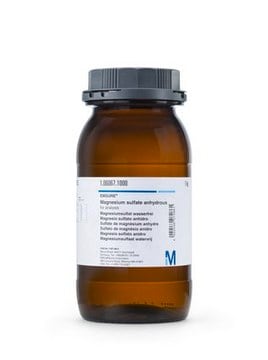793612
Magnesium sulfate
anhydrous, free-flowing, Redi-Dri™, reagent grade, ≥97%
About This Item
Recommended Products
grade
anhydrous
reagent grade
Quality Level
vapor density
<0.01 (vs air)
vapor pressure
<0.1 mmHg ( 20 °C)
product line
Redi-Dri™
Assay
≥97%
form
powder or granules
quality
free-flowing
SMILES string
[Mg++].[O-]S([O-])(=O)=O
InChI
1S/Mg.H2O4S/c;1-5(2,3)4/h;(H2,1,2,3,4)/q+2;/p-2
InChI key
CSNNHWWHGAXBCP-UHFFFAOYSA-L
Looking for similar products? Visit Product Comparison Guide
General description
Application
MgSO4 (anhydrous) can also be used as a drying agent in organic synthesis for the removal of traces of water from organic extracts.
Features and Benefits
- Increased efficiency – Eliminates time and effort of loosening hardened powders
- Safety – Eliminates tools of force used to break up clumps,·
- Ecology – Reduces waste as it does not stick to the packaging
- Economy – Faster preparation and solvation increase productivity and reduce costs
- Assured Quality – Excellent, expert-tested quality with no anti-caking agents
- Flexible volumes – Available from research amounts to scale-up quantities
Legal Information
Storage Class Code
13 - Non Combustible Solids
WGK
WGK 1
Flash Point(F)
Not applicable
Flash Point(C)
Not applicable
Regulatory Listings
Regulatory Listings are mainly provided for chemical products. Only limited information can be provided here for non-chemical products. No entry means none of the components are listed. It is the user’s obligation to ensure the safe and legal use of the product.
JAN Code
793612-1KG:
793612-2.5KG:
793612-BULK:
793612-12KG:
793612-VAR:
793612-500G:
Certificates of Analysis (COA)
Search for Certificates of Analysis (COA) by entering the products Lot/Batch Number. Lot and Batch Numbers can be found on a product’s label following the words ‘Lot’ or ‘Batch’.
Already Own This Product?
Find documentation for the products that you have recently purchased in the Document Library.
Customers Also Viewed
Our team of scientists has experience in all areas of research including Life Science, Material Science, Chemical Synthesis, Chromatography, Analytical and many others.
Contact Technical Service


